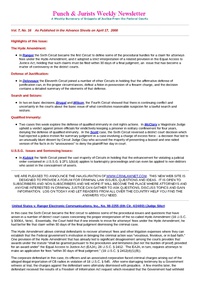Here, stressing the narrowness of the second Teague exception, the Court examined and analyzed eleven new rules announced by the Supreme Court and noted that in all eleven cases the Court held the rule at issue should not be applied retroactively.
Here the court held that prison officials were not entitled to a defense of qualified immunity for vindictively holding a prisoner in solitary confinement for four uninterrupted years, but it reduced the damages awarded from $660,000 to $237,500.
In this case, a prisoner had brought an action against …
In this case the Sixth Circuit became the first circuit to address some of the procedural issues and questions that have arisen in a number of district court cases concerning the proper interpretation of the so-called Hyde Amendment (18 U.S.C. § 3006A, Note). Essentially, the Court held that if …
In this case, the defendant's plea agreement "expressly provided that the govermment would not oppose the federal sentence running concurrent with Saling's state sentences." (Id., at 765). In addition, it was agreed that Saling would not be permitted to withdraw his plea because of dissatisfaction with his sentence. At …
In this decision, a divided Eighth Circuit panel affirmed Judge Kopf's earlier decision, reported at 41 F.Supp.2d 1004 (D.Neb. 1999), which was reviewed in the 6/21/99 issue of P&J. Essentially, in that decision, Judge Kopf held that when a defendant appeals a sentence based on a retroactive amendment to …
The defendants in this case were health care services providers convicted of perpetrating a scheme to fraudulently obtain Medicare funds. In an in limine motion, the defendants unsuccessfully sought to block admission of evidence that two of the government's witnesses had already pleaded guilty to participating in the scheme …
If one reads only the majority decision in this case, one would get the impression that it’s just another decision by the courts upholding the primacy of the defense of qualified immunity enjoyed by the police in a civil rights action under 42 U.S.C. § 1983 based on claims …
In this case, the defendant, Robert Kubick, and his attorney, William Herron, pled guilty to one count of conspiracy to commit bankruptcy fraud which arose out of Kubick’s concealment of assets from the bankruptcy court. On appeal, they both objected to a sentence enhancement under U.S.S.G. § 2F1.1(b)(4)(B) [formerly …
In this case the Eighth Circuit held that the Fourteenth Amendment's Due Process Clause does not permit prosecutors to use theories that are inherently contradictory in terms of their facts as a way of convicting two defendants of the same crime in separate trials. The petitioner's convictions arose from …
In this case, a police officer stopped the defendant's car because he could not see a registration sticker on the rear of the vehicle. Although the officer believed that such a visible registration sticker was required by law--and had been so instructed at the police academy--the law actually required …
Here the Ninth Circuit becamse the first Circuit to hold that, where payment of a fine is made a condition of supervised release, 18 USC § 3583(e)(2) gives the district court the power to modify that portion of the fine in the same way as restitution.
In this …
Here a divided en banc court affirmed a conviction after a driver had turned off the road to avoid a fictitious drug checkpoint holding that under the totatlity of circumstances the driver's seizure was justified by a reasonable suspicion.
United States v. Brugal, 209 F.3d 353 (4th Cir. …
Here, while acknowledging that Rule 11 does not require "literal compliance," a failure to advise the defendant that he faced a mandatory minimium sentence was error that was not harmless.
In this case, the defendant complained, inter alia, that the district court had failed to adequately inform him …
United States v. Brugal, 209 F.3d 353 (4th Cir. 2000) (En Banc) (Judge Hamilton)
United States v. Wilson, 205 F.3d 720 (4th Cir. 2000) (En Banc) (Judge Michael)
In both of these cases the Fourth Circuit rendered en banc opinions dealing with the continuing conflict and uncertainty among judges …
Both sides appealed from the judgment of the District Court a preliminary injunction barring enforcement of the Antiterrorism and Effective Death Penalty Act of 1996, Pub. L. No. 104-132, 110 Stat. 1214, except for its prohibition on providing "personnel" and "training," which was impermissibly vague.
The plaintiffs wished to …
In this case, the defendant originally entered the U.S. in 1961 on a student visa and he became a lawful permanent resident in 1969. In 1991 he was convicted of an attempted criminal sale of one glassine envelope of heroin to an undercover police officer in exchange for $20 …
This is another of the recent rash of cases in which defendants have been seeking to overturn their continuing criminal enterprise (CCE) convictions under 21 U.S.C. § 848 due to the district court's failure to give appropriate instructions that the jury must unanimously agree which of the specific violations …
This is another of the recent rash of cases in which defendants have been seeking to overturn their continuing criminal enterprise (CCE) convictions under 21 U.S.C. § 848 due to the district court's failure to give appropriate instructions that the jury must unanimously agree which of the specific violations …
In this case, the Eleventh Circuit joined at least seven other Circuits (the Second, Third, Fifth, Sixth, Seventh, Ninth and Tenth) in holding that, under extraordinary circumstances, the defense of justification may be available to defeat a felon in possession of a firearm under 18 U.S.C. § 922(g)(1) or …
